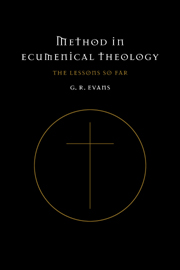Book contents
- Frontmatter
- Contents
- Dedication
- Preface
- Abbreviations
- Introduction: the ‘winter of ecumenism’?
- I What is ecumenical theology?
- 2 Changing attitudes and stages in ecumenism
- 3 Communication and dialogue
- 4 Ecumenical language
- 5 Historical method
- 6 The process in close-up
- 7 Ecumenical reception
- Conclusion
- Index
5 - Historical method
Published online by Cambridge University Press: 02 September 2009
- Frontmatter
- Contents
- Dedication
- Preface
- Abbreviations
- Introduction: the ‘winter of ecumenism’?
- I What is ecumenical theology?
- 2 Changing attitudes and stages in ecumenism
- 3 Communication and dialogue
- 4 Ecumenical language
- 5 Historical method
- 6 The process in close-up
- 7 Ecumenical reception
- Conclusion
- Index
Summary
HISTORY AND THEOLOGY
We have been asking the ecumenically central questions whether-there can be differences of expression of what is, or comes to be-understood to be, the same faith, and, if so, how we can know it to be the same faith. The ecumenical hope rests on the answer ‘Yes’ to the first of these questions, as it does to the central historical question of ecumenism, whether a common faith was shared before our divisions and can be rediscovered and shared again. There are difficulties in establishing the existence of an undivided primitive Church historically. Yet if the evident differences of expression of divided Christians do not somehow express the same faith in the same Christ, there is ultimately no basis for Christian unity. And that applies as much to unity of faith with Christians of other ages as it does to unity of faith among Christians now. So the relation between the history and the theology is crucial.
When those holding seemingly different theologies and using different forms of expression to speak of their faith need to know whether they speak of the same faith, there will almost always be a historical problem to be solved, because the differences will be likely to have their roots in a past division or at least a loss of common context in the past. So the first methodological requirement here is to try to establish a relation between history and theology.
- Type
- Chapter
- Information
- Method in Ecumenical TheologyThe Lessons So Far, pp. 114 - 147Publisher: Cambridge University PressPrint publication year: 1996



